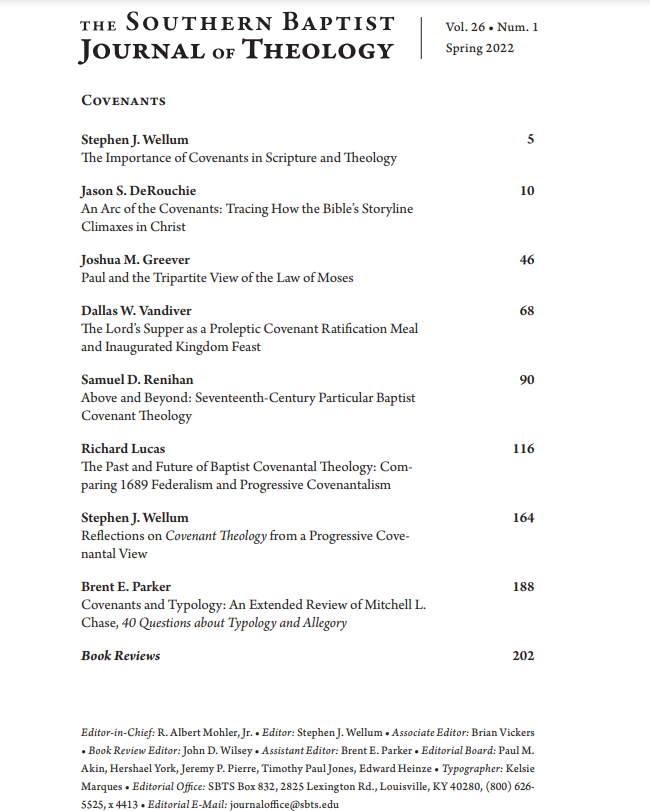A Brief Book Summary from Books At a Glance
Editor’s Note: In this “bonus” we highlight the Spring, 2022, edition of The Southern Baptist Journal of Theology, Stephen J. Wellum, editor. This issue highlighted the role of the covenants in the storyline of Scripture and the various Baptist approaches to their interpretation. Below is the introductory editorial from Stephen Wellum, followed by the concluding summaries from each contributor, all reproduced here with the kind permission of SBJT. You can download the entire issue here.
Table of Contents
Stephen J. Wellum
The Importance of Covenants in Scripture and Theology
Jason S. DeRouchie
An Arc of the Covenants: Tracing How the Bible’s Storyline Climaxes in Christ
Joshua M. Greever
Paul and the Tripartite View of the Law of Moses
Dallas W. Vandiver
The Lord’s Supper as a Proleptic Covenant Ratification Meal and Inaugurated Kingdom Feast
Samuel D. Renihan
Above and Beyond: Seventeenth-Century Particular Baptist Covenant Theology
Richard Lucas
The Past and Future of Baptist Covenantal Theology: Comparing 1689 Federalism and Progressive Covenantalism
Stephen J. Wellum
Reflections on Covenant Theology from a Progressive Covenantal View
Stephen J. Wellum
The Importance of Covenants in Scripture and Theology
All Christians agree that “covenants” are central, indeed fundamental to the Bible’s story. At its heart, “covenant” speaks of God entering into relationship with his creation and specifically his people—“I will be your God and you will be my people” (Exod 6:6-8; Lev 26:12, etc.). Also, all Christians agree that God’s redemptive plan is progressive, that is, it has not occurred at once but over time, and that the fulfillment of God’s salvific plan is in our Lord Jesus Christ. As such, all Christians acknowledge some form of redemptive epochs or dispensations across history demarcated by the biblical covenants, and that the fulfillment of God’s redemptive purposes in Christ has brought some kind of change or discontinuity from past eras. However, Christians disagree on the exact relationships between the covenants. This is not a new debate. In the early church, the apostles wrestled with the implications of Christ’s new covenant work (see Acts 10-11; Gal 3-4; Eph 2:11-22).
In current evangelical theology, Christians continue to disagree on the precise relationships between the covenants, which have implications for other theological disputes. For example, disputes regarding the nature of the covenants and their relationships lead to disagreement over such things as: the newness of the new covenant; what moral demands from the OT apply to Christians today, as reflected in differences regarding the Decalogue and the Sabbath/Lord’s Day observance; and how previous OT promises are now fulfilled in Christ and the church, related to the larger discussion of the Israel-Church relationship and the role of national Israel in God’s plan. Although evangelicals agree on many doctrinal points, disagreements over the nature of the biblical covenants are significant and they require careful discussion, interaction, and debate.
Broadly speaking, within evangelical theology, people tend to think about the nature and relationship of the biblical covenants within the views of either dispensational or covenant theology, while the viewpoints of progressive covenantalism, 1689 Federalism, and new covenant theology serve as mediating views. In this issue of SBJT, we will discuss important issues regarding the covenants from a progressive covenantal view, plus hear from the view of 1689 Federalism as we seek to compare and contrast these two viewpoints. In addition, we will interact with paedobaptist covenant theology from a Baptist viewpoint, with the goal of furthering our understanding of the biblical covenants and why a correct understanding of them is necessary to discern the message of the Bible and thus God’s self-disclosure which centers and culminates in Christ. Before we embark on this task, it may be helpful to outline the views of dispensational and paedobaptist covenant theology that the essays in this edition of SBJT will interact with in their discussion of various issues central to the covenants. . . .
[To continue reading this summary, please see below....]The remainder of this article is premium content. Become a member to continue reading.
Already have an account? Sign In
Buy the books

THE SOUTHERN BAPTIST JOURNAL OF THEOLOGY: COVENANTS